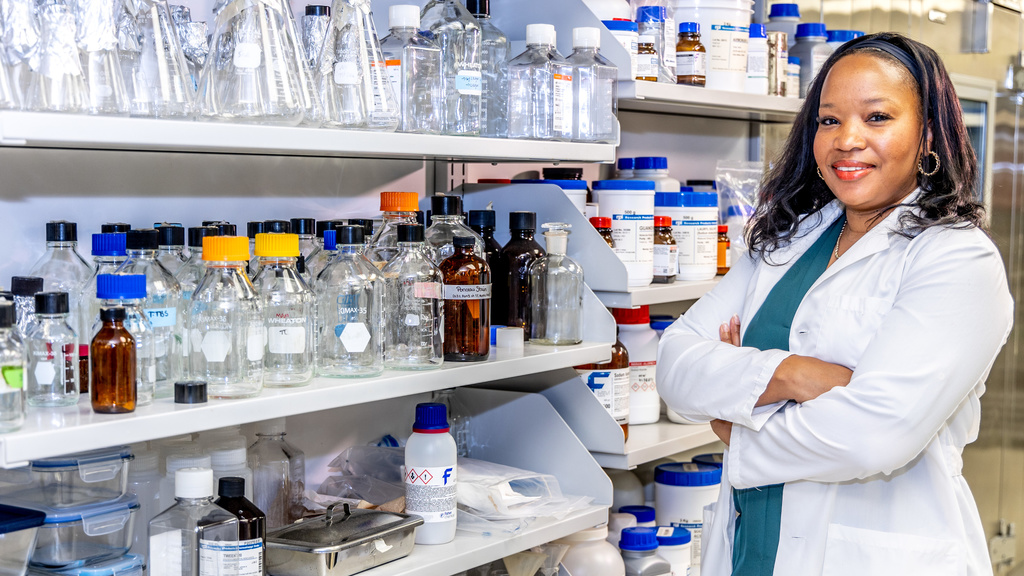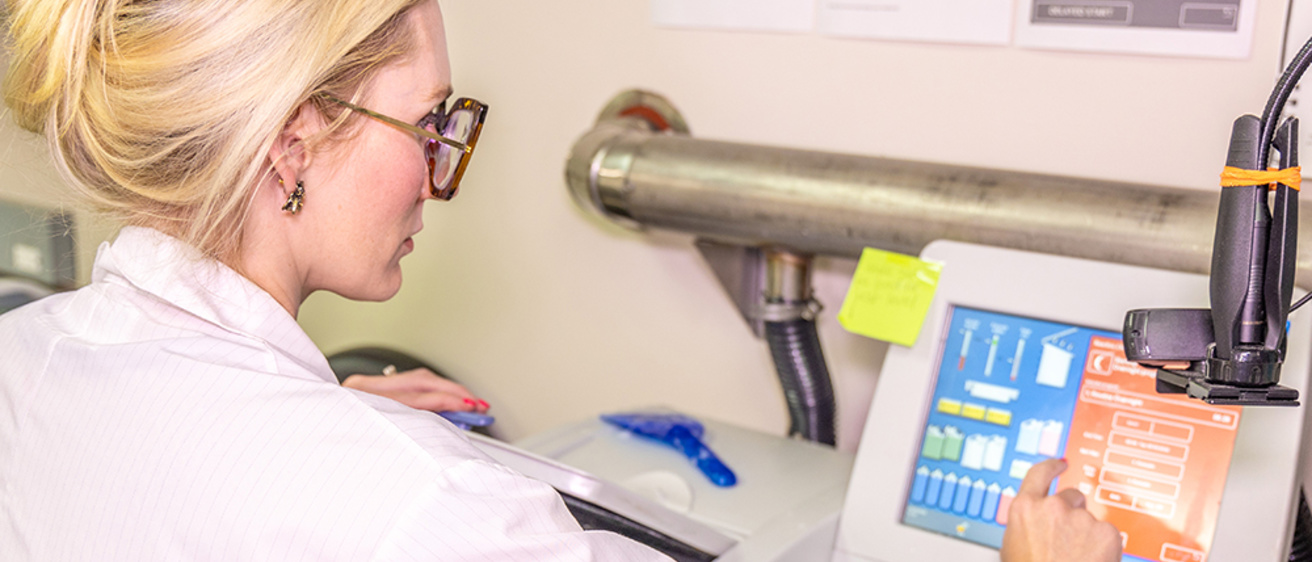
When Xian Jin Xie came to Iowa as the director of the Division of Biostatistics and Computational Biology in 2017, he had the goal of making Iowa a global leader in oral cavity cancer research.
“Our excellent faculty across campus—not just in dentistry, but also in medicine, pharmacy, and public health —and having access to the infrastructure and expertise of the Holden Comprehensive Cancer Center made Iowa the perfect place to build the oral cavity cancer program. The spirit of teamwork among our researchers is second to none,” said Xie, who is now the associate dean for research at the University of Iowa College of Dentistry.
But building this new oral cavity cancer program (OCP) would require establishing a common vision and mission, developing new structures to harness and bring together experts from across campus, and creating a plan to execute what was then an inchoate research program in oral cavity cancer.
Fast forward five years later, and the program is off and running.
Common Vision and Mission
Although there are numerous specialized research centers that focus on head and neck cancer generally, to date there are none that specialize in oral cavity cancer research specifically. Tumors in the oral cavity, which affect almost 400,000 worldwide people per year, are most often found on the tongue, at the bottom of the mouth or lower lip, but sometimes in other places too. Oral squamous cell carcinoma (OSCC) represents about 90% of oral cavity tumors. Furthermore, Iowa’s age-adjusted oral cavity cancer rate is the highest in the United States (2015-2019).
The risk factors for such tumors differ from head and neck cancer more generally. The most common forms of tumors in these areas are, for instance, strongly correlated with alcohol and tobacco use, but throat cancer is strongly correlated with human papillomavirus (HPV) instead.
Clinically, the conditions are also distinct. Oral cavity tumors are often first diagnosed in dental clinics, and in fact, many pre-malignant tumors are found, since oral cavity cancer screening is routine in dental clinics. This makes treatments which can prevent tumors from becoming malignant especially important in oral cavity cancer research.
Thus, one research team is exploring use of probiotics to reduce the risk of tumors developing in the oral cavity.
Another research team is also working on a vaccine that could potentially prevent pre-malignant tumors from becoming malignant.

“There is an urgent need to identify effective local and/or systemic therapies as an adjuvant to surgery to lower the risk of recurrence and malignant transformation,” explained Aliasger Salem, professor of pharmacy, associate vice president of research administration at the University of Iowa, and the lead for one of three main research teams in the OCP.
“Our preliminary data has shown promising anti-tumor immune responses using in situ immunization with a toll-like receptor 9 (TLR9) agonist, and we hypothesize that in situ immunization with this agonist will trigger cytotoxic T cell infiltration thereby reducing oral leukoplakia lesion recurrence and/or malignant transformation to oral squamous cell carcinoma,” he added.
Of course, OSCC does occur and needs to be treated. A third team is exploring methods to improve treatment and bone regeneration after surgery using bioengineering and miRNAs.
Thus, Iowa’s focus on oral cavity cancer specifically fills an important gap in the current research landscape and will improve healthcare in Iowa.
Developing the Infrastructure
Once the mission and vision were established for the program, it was vital to develop the infrastructure to support the unique features of an effective oral cavity cancer program. Drawing together researchers from across Iowa’s campus was vital.
“Oral cancer diagnosis and treatment are a primary concern for dentistry as a whole and of course particularly for the University of Iowa and its research mission,” explained Emily Lanzel, clinical assistant professor of oral pathology, “and a true multidisciplinary collaboration is vital to produce the most effective research.”
One part of this kind of collaboration in oral cavity cancer research requires the incorporation of dentists and dental researchers into the research team. Dentists are the primary source of patient referrals for oral cavity cancer since they universally screen patients for signs and symptoms of oral cavity cancer.
“The University of Iowa College of Dentistry providers strive to detect and treat, if necessary, premalignant as well as malignant diseases of the oral cavity, and it’s cohort of patients provide a large enough patient pool to derive past, present, and prospective data as needed,” Lanzel added.

However, connecting these dental providers to the robust resources of larger cancer research networks is also essential to support the long-term viability and sustainability of such a research program. The Holden Comprehensive Cancer Center (HCCC) has those resources, including the ability to conduct Phase 1 clinical trials and to process samples within their infrastructure. But it was important to set up structures in place to support on-going collaborations with the HCCC to effectively draw from experts across campus who were doing effective and relevant research in the area.
“It is a pleasure working with the College of Dentistry to establish Iowa as a leader in oral cavity cancer research. The Holden Comprehensive Cancer Center includes investigators from 6 colleges and 36 departments, and dentistry colleagues are important contributors,” said George Weiner, professor of internal medicine and director of the Holden Comprehensive Cancer Center.
Executing the Plan
Since Fall 2018
4+ years
40+ All-OCP meetings
30+ Faculty researchers participating

With the vision, mission, and infrastructure in place, Iowa was ready to get started. The initial meetings began in the fall of 2018 and continue in earnest to this day.
In addition to numerous and regularly weekly and biweekly meetings for subgroups, the full OCP team met every other week to update the entire group on overall and subgroup progress.
Through this work, the team refined its goals, research teams and projects, and began developing the infrastructure to support an on-going oral cavity cancer program at Iowa.
The holistic approach of the team encompasses the entire spectrum of oral cavity cancer research, including microenvironmental and genetic predispositions and causes of oral cavity cancer, and its prevention, detection, diagnosis, prognosis, treatment, and recovery. This approach always started with the end point of improving patient outcomes in mind.
In February 2021, the University of Iowa awarded the OCP a $600,000 grant to further develop the infrastructure, develop preliminary research data as part of the program, and prepare to apply for a Specialized Program of Research Excellence Grant from the National Institutes of Health.
“I am so proud of what our team has accomplished already, but the future of the oral cancer program is even brighter as Iowa is poised to be an international and national leader in oral cavity cancer research due to the team’s extraordinary work over the last four years,” Xie exclaimed with pride.
